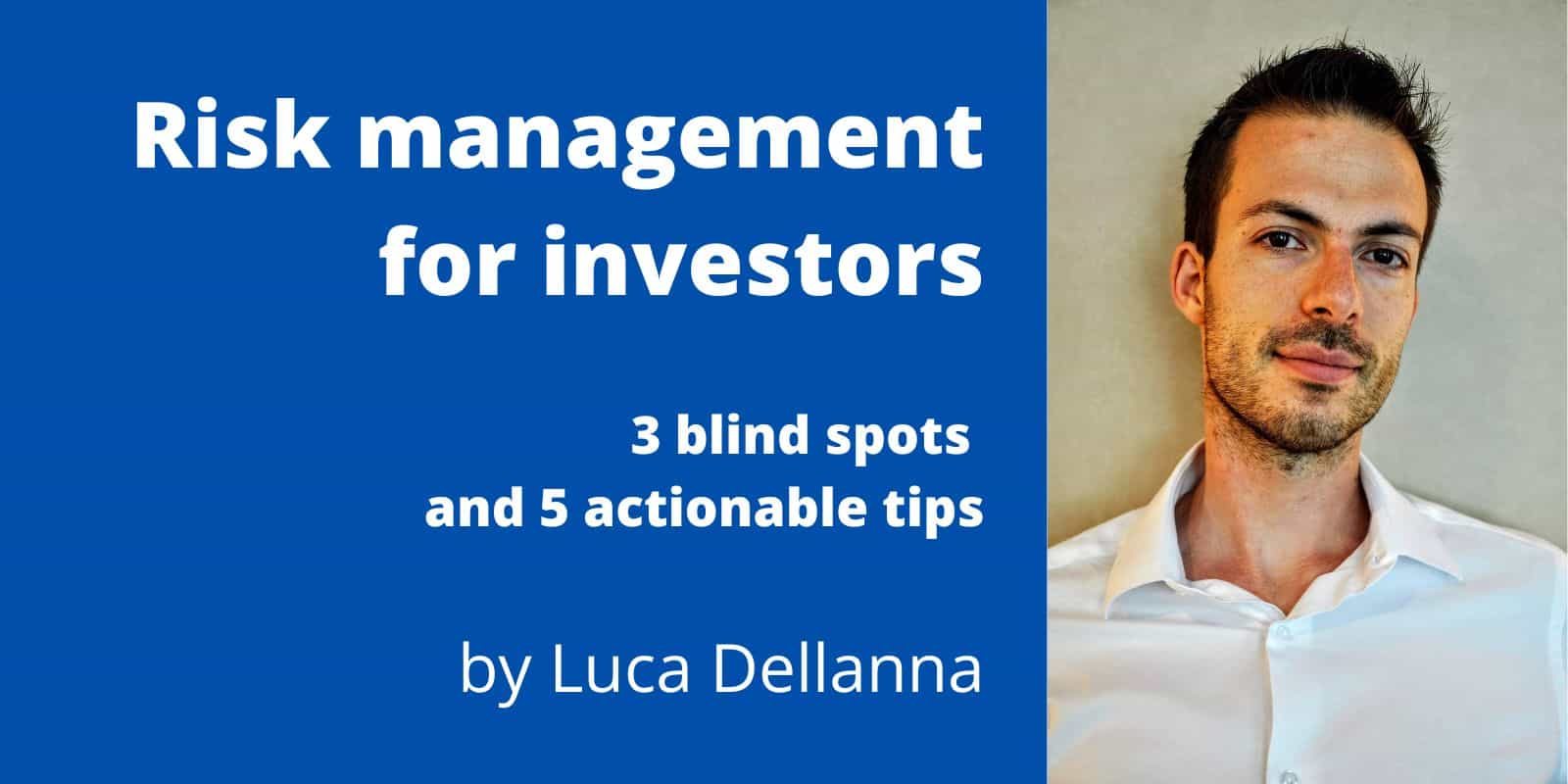The three blind spots of savvy investors when it comes to risk management and five actionable tips to address them.
Reading Chris Arnade’s book “Dignity” (recommended!) made me realize that there are choices and Choices.
choices, with the lowercase “c”, are decisions in which at least one option is aligned with your values and circumstances. choices might require sacrifices, but they allow you to realize your dreams, or at least to live a life you can respect yourself for.
Choices, with the uppercase “C”, are decisions in which both options require you to compromise on your values and on those of your community, no matter how hard-working and well-intentioned you are.
I used to think that getting a good job (whatever your personal definition of good) was a choice. I now believe that, for some but not for all, they are a Choice.
The difference between choices and Choices are hard to understand for those of us whose values and circumstances coincide with those which are rewarded by today’s front-row society. So, let’s try a radical experiment in empathy. Imagine a parallel world. It’s 2050 and you freshly graduated from high school.
…
Your country is different from what it was. The jobs that required a college degree moved overseas, where graduate labor is cheaper. Instead, the jobs that stayed require a different kind of certification. They require that you are a member of the Temple.
It’s not immediately clear to you why being a member of the Temple is important – it’s not like the things people learn there are relevant to most job, just like half a century ago a college degree was required to land a good job, even for jobs where university knowledge was irrelevant – and yet, here we are.
[Remember: this is an experiment in empathy. For just a few minutes, suspend your disbelief and accept the current hipotethical situation: good jobs require having attended the Temple – no reference to any religious organization –, just like in the real world, 2020, good jobs require having attended college.]
As a freshly graduate from high school, you now face a hard choice: attending the Temple, or getting an underpaid back-breaking job.
People in the TV, successful people, people in the front row, they all say it’s an easy choice. For them, it was an easy choice because they wanted it and they could afford it. They’re all templegoers – that’s how they got the good job. They all value going to the Temple, their families value going to the Temple. They worked hard at the Temple, but they never had to compromise their values or their families’.
Of course, there are rational reasons for justifying why going to the Temple should be a requirement for landing a good job. Those who go to the Temple have to volunteer there for a few years, so the Temple selects for the hardest working and for the kindest hearted.
“But,” you think, “I am hard-working and kind-hearted too. I don’t want to have to go to the Temple to prove it. I already proved it in years of high school. I can prove it if you give me a job.”
…
Your high school brought you to visit the Temple last year, but you felt like an outsider. No one in your family ever attended the Temple.
Moreover, if you told your parents that you’re moving out to enter the Temple, which is hours away by car, they would look at you with a mix of disappointment and sadness. You are abandoning them. They need you to work, their health is bad, they need you to provide for them, now.
There is another problem, being accepted to the Temple is hard. Most of your friends’ applications got rejected. They’re smart, but they apparently didn’t use the correct words, the way of speaking that only children of templegoers know.
Of course, you could learn how to speak like the son of a templegoer, but from whom? You do not know personally any. Your friends’ families never went to the Temple.
Of course, you could donate some money to the Temple to improve your chances of getting in, but you don’t have much.
There is an even harder problem: you do not even know that you got rejected because of the way you speak.
You’re faced with a choice you don’t want to make, as neither option aligns with your values. You dream to stay in your town, next to your parents, next to your friends, and to work an honest job with a respectable salary.
The templegoers tell you to move to another town, to make new friends there, but why should you make friends with people who are so different from you?
The templegoers tell you to get a dorm near the Temple, find a side-job while you attend it, and send the money to your parents, but they do not only need money. The cash cannot help them with their chores, with their needs, with their problems. Perhaps your parents are addicts. Perhaps they’re depressed. Perhaps they’re aging. They don’t (only) need cash, they need you.
You’re faced with a Choice where you lose on both sides: whether you get accepted to the Temple and move away, abandoning your parents and your community, or whether you end up working a job none of the templegoers would do unless starving (or perhaps even if starving).
Of course, it’s not the templegoers fault. None of them has any interest in you having to face a Choice. None of them broke the law. None of them broke any of their values. None of them wishes you bad. Some of them even want to help.
You know it, but you get angry nevertheless. You’re hard-working. You want to work. But you don’t want to work a back-breaking job, not for just a few dollars an hour.
You curse the system. The system which decided that going to the Temple is a requirement for finding a job.
Templegoers say you’re complaining. They took the hard side of the choice, they worked hard to get inside the Temple. To them, everyone who doesn’t work hard to get in the Temple is lazy.
You know you’re not lazy. To you, they are the lazy ones: they spent their lives on autopilot, studying like their parents, going to the Temple just like their parents, making the same choices as their parents, choices they were expected to make, choices they could afford to make. What do they even know about real Choices?
…
One day, you see a new candidate in the TV. Templegoers say that he’s dumb because he doesn’t know the psalms. But psalms only matter in the templegoers’ world. That is not your world. As far as you know, that is not The World.
You like the candidate. He is the only one who doesn’t look down at you for not having gone to the Temple.
The templegoers do not understand why he’s getting public support. They look down on you for liking him. That makes you only like him more, and like them less.
…
Recently, templegoers started to listen to the protests of people like you. They lowered the acceptance bar to the Temple. While a noble action, it only solved part of the problem. It only helped those who wanted to get in the Temple in the first place.
What about those who cannot go to the Temple – not because it’s hard to get in, not because they cannot afford paying for it, but because going would mean to leave behind people they cannot afford to leave?
To you, being offered a kind of help you cannot accept does not count as being helped.
And that is the source of the problem. Not of all problems – just of one problem, but that’s your problem.
You want to be able to work at your conditions, just like templegoers got a job at their conditions. They had to make sacrifices, they worked hard, but most of them did so at their conditions.
But you, you, you cannot do anything at your conditions. And it hurts. It hurts so much that you think you’re in hell already.
…
This essay is inspired by Sam Richard’s TedX’s talk “A radical experiment in empathy”, which happens to be my favorite YouTube video ever, and by Chris Arnade’s excellent new book “Dignity”.
I don’t think I have to write this – but these days malicious misinterpreting is a thing, so – here are some things this essay is NOT: self-pity, guilt, self-hate, an excuse for laziness, an excuse for violence, a politically-colored piece, a critique of the current educational system (at most it is a critique of its monopoly and of its perceived necessity, but not of most educators within), a critique of religion (I think it has value, at least in its decentralized and non-aggressive forms). Here are some things this essay is: a way to clarify my thoughts, a way to consider a perspective which is often ignored, a way to see different axes on which tradeoffs take place, axes which might be invisible if our lives are perpendicular to them.
This essay does not pass a judgement upon anyone. Judging would require having a comprehensive overview of the truth, one that perhaps no single individual can have.
This essay is also not an exoneration from those who decided not to work hard out of pure laziness, whether they faced a choice or a Choice.
I do not pretend to have depicted a clear picture of how it feels to be required to made a Choice you don’t really have – I am extremely hard-working, I am proud of who I am, of what I do, and of the sacrifices I made to get there, but I had the chance to find my passions and my conditions aligned with what the society I live in values. Hard work is not that hard, in these conditions. So, do not take this essay as an imposition of truth. I don’t know what the truth is, assuming there is only one. It’s just a thought on a topic I only recently discovered existed.
P.S. If you want to read more about empathy, I wrote a free book about how people with Autism Spectrum Disorders perceive the world.
…


